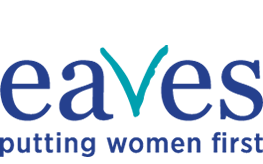Closure of Eaves - another nail in the coffin for the women’s sector?
It is with huge sadness that Eaves announces that it will cease operations on 30th October 2015.
Eaves has been operational since 1977 and is particularly known for its specialist services for women victims of violence. These include :-
- the Poppy project which has supported some 2000 women victims of trafficking since its inception and helped 45 women bring their traffickers to justice obtaining combined sentence of 423 years.
- the London Exiting Advocacy project for women exiting prostitution which is linked to unique primary research with 114 women and a specialist exiting prostitution training programme.
- the Alice project which has averted homelessness for 294 women this year women with multiple and complex disadvantages including no recourse to public funds, mental health, benefit “sanctions”, child custody, needing access to foodbanks and transport and basic welfare etc.
Chair, Louisa Cox, said “Eaves has done its best to ensure service users have other services to go to and we have been able to transfer some of our projects to other organisations. The quality of services and safety and well being of our service users has always been our priority”.
More information about onward referrals for service users and support services is available on this site.
With reference to how Eaves reached this state of affairs, Ms Cox, continued,
“Eaves has had to contend with high rents, project funding that does not cover the core costs so an increasing deficit and most recently the tragic illness, and subsequent loss, of our inspirational CEO Denise Marshall. We have taken a range of measures to diversify our funding base, increase donations, cut costs, move offices, but ultimately none of these steps was enough to save us”.
Cuts, reductions and closures have of course hit a whole range of non-governmental organisations. However, there is much evidence to suggest that women are bearing the brunt. Fair Deal for Women found that it is women who have paid off 79% of the deficit to date. It is more likely to be women in low-paid, insecure, part-time and public sector work, it is more likely to be women with caring responsibilities who may have to top up their incomes or rely exclusively on benefits and it is more likely to be women who need to rely on public, voluntary sector and specialist services. Yet these are precisely the areas being cut.
But it is not purely and simply cuts that are at play. It is abysmal commissioning whereby commissioners either do not know or do not care what they should be looking for or how to assess a bid other than by lowest unit cost with no regard to quality.
This is evidenced by the fact that large, generic, non-specialist organisations are winning tenders, expanding, accumulating vast reserves and specialist, smaller organisations with 40+ years of history with high levels of self referrals from women (a sure sign of the value of the service to the women) – are shrinking and having to use their scarce reserves to survive.
The Independence Panel in their report “An Independent Mission ; the voluntary sector in 2015” have been charting, since 2011, a combined attack on the voluntary sector. They highlight gagging clauses, poor commissioning and threats to the distinctive identity, character and campaigning voice of the sector to name but a few.
Big society, transparency and accountability touted by the Libdem-Conservative Government when they came into power, always had a hollow ring to some of us.
Cox said, “Cutting away and undermining accountability mechanisms and the independent voice, purpose and action of the sector is the completion of an ideological project to shrink the state, silence opposition and monetise misery”.
“But both the staff and the service users at Eaves are resilient and determined. Even if Eaves is not there, the women who have made Eaves what it was are still there and still fighting. The fight to end male violence against women continues and will be won.”
How you can help Get inspired with fundraising ideas or join one of our fundraising events...
Sign up for our newsletter Stay up to date with our supporters, campaigns and consultations...
Our success stories
Women in Crisis

2nd September 2015
Prostitution and survival. Nina had been involved in prostitution from a very young age. She had been finding… read more
Women in Crisis

2nd September 2015
Being trafficked into the UK. Noreen was born to a poor family in Pakistan. She went on to work as a domestic… read more



